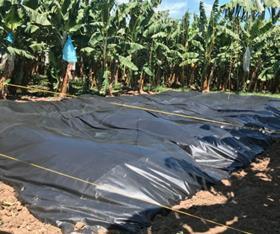
Costa Rica declared a state of phytosanitary emergency on Wednesday in a clear escalation of its struggle to protect its banana industry from Fusarium Wilt TR4.
President Carlos Alvarado, and the Minister of Agriculture and Livestock, Renato Alvarado, signed the decree that enables resources from the State Phytosanitary Service to combat new or existing pests that may cause damage to national agriculture, as well as the execution of preventive actions that protect productive activity.
In a statement, the president said the aim was “to reduce a risk that could be a threat to banana producers…and protect our agri-food sector and the thousands of people who work in this activity”.
The first Latin American cases of Fusarium Wilt TR4 – also known as Panama disease – were detected last year in Colombia. The pathogen is not yet present in Costa Rica, and to prevent this the funds will be allocated to investment, training and outreach to technicians, producers and the general public and to intensify continuous surveillance activities in the plantations of musaceae (banana and plantain).
“A country-wide effort is required, but it goes much further than this. We also need international support; it is about maintaining an articulated job for the benefit of the banana industry and its workers, ”said Jorge Sauma, manager of the National Banana Corporation (Corbana).
According to Corbana, the industry generates 40,000 direct jobs and 100,000 indirect jobs, which represents 76 per cent of the workforce in the Caribbean area. Costa Rica exports around US$1bn of bananas every year.
TR4 is a fungus that colonises, infects and destroys Cavendish plants, which account for the overwhelming majority of bananas traded and sold around the world. It has already caused major damage to banana plantations in parts of Asia, with other cases reported more recently in Australia, Jordan, Mozambique and Pakistan.
With four of the world's top five banana exporters in Latin America, the potential impact of TR4 on the region’s banana business is considerable.
The pathogen that is spread, mainly, by the movement of planting material in the soil particles that adhere to people’s footwear, tools and vehicles, and through runoff water or irrigation that drags the fungus from one place to another.
The only preventive measure currently available is quarantine, preventing the transfer of affected soil or plant material from infected areas to Fusarium TR4-free areas.



